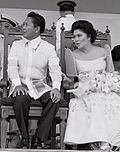| ||
|---|---|---|
Related | ||
Historical distortion regarding Ferdinand Marcos is a political phenomenon in the Philippines. Ferdinand Marcos was the country's president between 1965 and 1986. Distortion, falsification, or whitewashing of the historical record regarding this period, [1] [2] sometimes referred to using the phrases "historical denialism", "historical negationism", or "historical revisionism" as a euphemism for negationism, [3] [4] is an academically documented phenomenon [5] linked to the return of Marcos' immediate family and political allies to government positions, [6] [7] [8] as well as the hero's burial of Marcos himself in 2016. [5] It continues Marcos' own efforts to create a cult of personality for himself, which in itself involved various forms of historical distortion. [9] [10]
Contents
- Historical denialism
- By Marcos family members
- By Marcos associates
- Educational system
- Institutions, monuments, and museums
- Organized disinformation efforts and use of troll accounts
- Role in the Marcos burial
- Role in Philippine elections
- Studies on disinformation spread
- Propaganda narratives
- Historical distortion portrayed in media
- See also
- References
Some of the earlier examples of distortion involved various instances of historical denialism by the remaining Marcos family members and their followers, which involved trivializing of the human rights violations and economic plunder that took place during the Marcos administration, as well as the role played by the Marcos children in the administration. [11] [12] [13]
Into the 2020s, various studies have uncovered systematic disinformation campaigns run by top public relations firm executives, [14] [15] efforts to create a false impression of a scholarly body of pro-Marcos literature, [16] and the systematic use of click armies and digital black ops to spread strategic disinformation on social media. [17]




